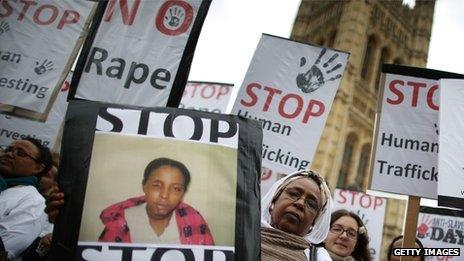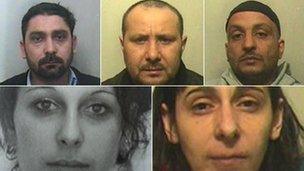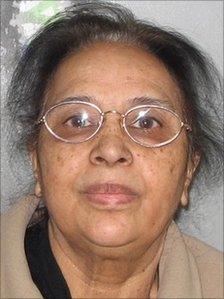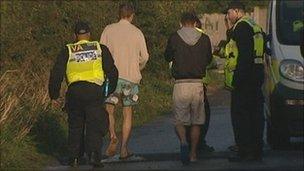Modern day slavery in the UK
- Published

Campaigners outside Parliament on Anti-slavery Day, October 2013
Police say the case in which three women are believed to have been imprisoned in a London home for more than 30 years is "unique" and is not like previous human trafficking and slavery cases encountered in London.
But it follows a number of disturbing cases of slavery, captivity and human trafficking in Britain in recent years.
Official figures on the scale of the problem come from the UK Human Trafficking Centre, part of the National Crime Agency.
In 2012, it identified 2,255 potential victims of human trafficking - an increase of 178 (9%) on 2011, according to its report, external.
Of these potential victims, 778 were either found to have been trafficked or were awaiting a conclusive decision on their status. Of the 778 potential victims, 402 people - or 52% - were found to have been trafficked.
The top five nationalities of those identified were Romanian, Polish, Nigerian, Vietnamese and Hungarian.
Some 71% of the potential victims were adults, while 24% were children. The age of 99 potential victims was unknown.

Five people were found guilty of human trafficking charges after a woman was snatched from Slovakia
The two most prevalent types of exploitation reported were sexual exploitation, which accounted for 35% of the potential victims, followed by labour exploitation (23%).
Of the potential child victims, 28% reported being sexually exploited, and 24% reported criminal exploitation.
'Like Dickens'
In October, Azam Khan was jailed for 12 years for assaulting, raping and holding a woman prisoner after she was snatched from Slovakia and trafficked to Lancashire.
Khan, 34, of Burnley, was said to have "bought" the vulnerable 20-year-old and "married" her at a local mosque to try to halt his deportation from the UK to Pakistan.
Five other people - Imrich Bodor, Abdul Sabool Shinwary, Kristina Makunova and Petra Dzudzova - helped in the trafficking of the woman, who was unable to speak English or ask for help.
Prosecutor Joe Boyd at the trial in Preston Crown Court described the victim's story as like "something from a 19th Century novel by Dickens".
'Unpleasant and manipulative'
Ilyas and Tallat Ashar brought a deaf girl from Pakistan and kept her in their cellar.
Also in October, a couple who trafficked a 10-year-old girl to the UK, then repeatedly raped and kept her as a servant for nearly a decade, were jailed.
Ilyas and Tallat Ashar brought the girl, who is deaf, from Pakistan and kept her at their home in Eccles, Salford, where she slept in the cellar.
Ilyas Ashar, 84, who was found guilty of 13 counts of rape, was jailed for 13 years at Manchester Crown Court.
Tallat Ashar, 68, convicted of benefit fraud and trafficking, got five years.
Judge Peter Lakin, sentencing, said the couple were "deeply unpleasant, highly manipulative and dishonest people".
'Prisoner'
In 2010, a BBC Radio 4 File on 4 programme interviewed three victims of domestic servitude.
One of them, Patience Asuquo, from Nigeria, said she was brought to London to work in the home of a solicitor, Kenny Gbaja.
She said she was promised £50 a week as a nanny - but was instead subjected to verbal and physical abuse over a period of three years, and was not allowed to leave the house without permission.
"I was treated like a slave, like a prisoner," she said.
Following an enquiry, Gbaja was charged with common assault and given a 12-month conditional discharge.
'Appalling greed'

Saeeda Khan ordered Mwanahamisi Mruke around by ringing a bell
Section 71 of the Coroners and Justice Act 2009, which came into force in 2010, created a new offence of holding another person in slavery or servitude or requiring them to perform forced or compulsory labour.
And in 2004, Parliament created a specific offence of trafficking someone into the UK for forced labour.
Former hospital director Saeeda Khan was believed to be the first person convicted under that law when a jury found her guilty of trafficking a Tanzanian woman into the country to work as her domestic slave.
Khan, 68, was ordered to pay £25,000 to Mwanahamisi Mruke, 47 - who was flown from Tanzania in 2006 and made to work 18-hour days for Khan, 68, at her home in Harrow, north-west London - in 2011.
The judge at Southwark Crown Court, who also gave her a suspended nine-month prison term, said she was guilty of "the most appalling greed".
Operation Netwing
Many forced labour investigations have focused on the trafficking of women in to the sex trade in the UK.
But in September 2011, police acting under Operation Netwing raided the Greenacres caravan site in Leighton Buzzard, Bedfordshire, and freed 24 people who were being held against their will in filthy and cramped conditions.
Some of the men had been held for up to 15 years, and others for just a few weeks. Some of them were from Poland, Latvia and Lithuania; others were British citizens.
The men were deemed "vulnerable" and had been recruited at soup kitchens and off the street with the promise of paid work, food and lodgings.
In May, Tommy Connors Senior, 53, was jailed for eight years and his son Patrick, 21, for five years at Luton Crown Court.

Men were found in squalid conditions at the Bedfordshire site
The pair had been convicted last July of servitude, compulsory labour and assault charges after a trial at the same court.
Five members of the same traveller family were all jailed in December last year.
William Connors, 52, wife Mary, 48, their sons, John, 29, and James, 20, and son-in-law Miles Connors, 24, were convicted of conspiracy to require a person to perform forced or compulsory labour between April 2010 and March 2011 following a three-month trial at Bristol Crown Court.
'Immediate measures'
Hungarian nationals Joszef Budai, 24, and Andrea Novak, 20, were jailed for eight years after being found guilty of trafficking young women into Britain and forcing them to work as sex slaves.
They were sentenced at Croydon Crown Court in March 2010, after being convicted of a string of trafficking and prostitution offences.
Judge Simon Pratt described the case as "the closest to human slavery as you could possibly get".
While figures detailing the total number of potential victims of human trafficking in 2013 are not yet available, a report, external was published this month based on National Referral Mechanism (NRM) statistics - a process used to identify trafficked individuals and provide them with protection and support.
It found that from April to June this year, 383 potential victims of trafficking - comprising individuals from 52 countries - were referred to the NRM.
As of 1 October, 114 potential victims were found to have been trafficked, while 58 people were awaiting a 'reasonable grounds' decision and 70 people were awaiting a conclusive decision on their status.
Frank Field MP, Chair of the Modern Slavery Bill Evidence Review and Vice Chair of the Human Trafficking Foundation, called for "immediate measures" including a new Modern Slavery Bill.
"All of the evidence to date highlights the need for urgent action," he said. "Modern slavery is alive and well in Britain, and needs to be stopped."
- Published22 November 2013
- Published12 September 2011
- Published10 October 2013
- Published16 March 2011
- Published23 October 2013